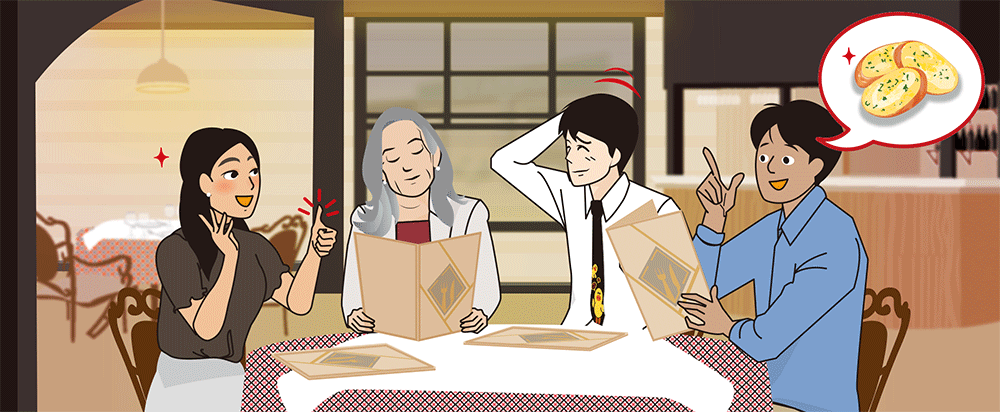Today's Point
今日のポイント
ローラの同僚、アリッサが遅れてディナーにやって来ました。
早速アリッサに挨拶をするケン。またしてもネクタイをほめられました…。
「このガーリックブレッドは食べたほうがいいよ。」と、アリッサに料理を勧めるジェームズ。
たくさん食べて、飲んで、ローラもアリッサも満足そうです。
ネクタイのお陰?で接待ディナーは大成功!

Story of the Day
今日のストーリーRepeat after your teacher.
先生の後に続けて言ってみましょう。
| James: Hello, Alyssa! | ジェームズ:やあ、アリッサ! |
|---|---|
| Alyssa: Sorry I’m late! | アリッサ:遅れてごめんなさい! |
| Alyssa: Traffic was terrible. | アリッサ:渋滞がひどくて。 |
| Laura: Hi, Alyssa. | ローラ:こんにちは、アリッサ。 |
| Laura: You know James. | ローラ:ジェームズは知っているわよね。 |
| Laura: And this is Ken. | ローラ:こちらはケンさんです。 |
| Laura: He just arrived from Japan. | ローラ:日本から到着なさったばかりよ。 |
| Ken: Hello, Alyssa. | ケン:こんにちは、アリッサさん。 |
| Ken: It’s a pleasure to meet you. | ケン:はじめまして。 |
| Alyssa: It’s great to meet you, too. | アリッサ:こちらこそ、はじめまして。 |
| Alyssa: Nice tie! | アリッサ:すてきなネクタイですね! |
| Ken: Thanks... | ケン:ありがとうございます。 |
| James: You should try the garlic bread. | ジェームズ:このガーリックブレッドは食べたほうがいいよ。 |
| James: It’s delicious. | ジェームズ:とてもおいしいから。 |
| Alyssa: Oh, yes. | アリッサ:そうね。 |
| Alyssa: I love garlic bread. | アリッサ:私、ガーリックブレッドは大好きよ。 |
| Alyssa: I’m going to try this shrimp cocktail, too. | アリッサ:このシュリンプ・カクテルも食べてみるわ。 |
| James: Go ahead. | ジェームズ:どうぞ。 |
| James: Should we order more wine? | ジェームズ:もっとワインを注文しようか? |
| Alyssa: Of course! | アリッサ:もちろん! |
Key Phrase
キーフレーズRepeat after your teacher.
先生の後に続けて言ってみましょう。
You should try the garlic bread.
Vocabulary / Expressions
ボキャブラリーと表現Repeat after your teacher.
先生の後に続けて言ってみましょう。
| traffic(名詞) | 交通、通行 |
|---|---|
| terrible(形容詞) | ひどく悪い |
| arrive(動詞) | 到着する |
| order(動詞) | 注文する(名詞)注文、順番 |
Exercise
エクササイズ ARead the conversation aloud with your teacher. Fill in the blanks with a, b and c.
After that, fill in the blanks with your own words and practice the conversation with your teacher.
下記の会話の空欄に、a, b, cそれぞれの言葉を入れて、先生と一緒に音読してみましょう。 そのあと、空欄に入る言葉を自分で考えて、先生と会話をしてみましょう。

| Ken: Hello, Alyssa. | ケン:こんにちは、アリッサさん。 |
|---|---|
| Ken: It’s a pleasure to meet you. | ケン:はじめまして。 |
| Alyssa: It’s great to meet you, too. | アリッサ:こちらこそ、はじめまして。 |
| Alyssa: Nice tie! | アリッサ:すてきなネクタイですね! |
| Ken: Thanks... | ケン:ありがとうございます。 |
| James: You should _______ (a. eat this b. have some of this c. have a bite). | ジェームズ:ぜひ(a. これ食べたほうがいいよ b. これ少し食べたほうがいいよ c. これ一口食べたほうがいいよ)。 |
| James: It’s delicious. | ジェームズ:とてもおいしいから。 |
| Alyssa: _______ (a. You're right. b. I think so, too. c. That's true.) | アリッサ:(a. そうね b. 私もそう思うわ c. 本当ね)。 |
| Alyssa: I love garlic bread. | アリッサ:私、ガーリックブレッドは大好きよ。 |
| Alyssa: I’m going to try this shrimp cocktail, too. | アリッサ:このシュリンプ・カクテルも食べてみるわ。 |
Exercise
エクササイズ B (Vocabulary Building)Choose the correct word from the box.
空欄に当てはまる言葉を選んで文章を完成させてください。
- traffic
- terrible
- arrived
- order
- The ______ in the city is very bad.
- Can I ______ a drink?
- The weather is ________!
- The plane ______ on time.
Exercise
エクササイズ CSituation: Your friend is sick. Give her some advice.
ロールプレイ: 友人が病気です。何かアドバイスをしてあげてください。


Extra Exercise
Try the Extra Exercises. As with Exercise A, become familiar with some of these more advanced phrases.
エクストラ・エクササイズに挑戦してみましょう。
エクササイズAと同じ要領で、より高度なフレーズを練習してみましょう。
| Ken: Cindy, there was a call for you from someone named Laura. |
|---|
| Ken: Unfortunately, I forgot to ask which company she’s from. |
| Cindy: Oh, it must be Laura from Jupiter Technica. |
| Ken: Oh good. You know who it is then. |
| Cindy: We’re going to have a lunch meeting tomorrow. |
| Cindy: I might ask you to handle this account in the near future. |
| Ken: Should I (a. join you tomorrow b. go with you c. be there for the meeting)? |
| Cindy: That’s a good idea. |
| Cindy: I can introduce you. |
| Ken: Great! I’ll mark my schedule. |
| Cindy: Remember, Ken, you shouldn’t (a. wear that silly necktie b. drink too much wine c. order too much food). |
| Ken: No need to tell me. |
| Ken: I learned my lesson the hard way. |

- named~は「~という名前の」という意味の形容詞で、someone named Laura「ローラという名前の誰か」とsomeoneを後ろから修飾しています。
- You know who it is then.「じゃあ、あなたはそれが誰だかわかっているんですね」は、間接疑問文です。〈主語+動詞+目的語〉の文の、目的語に当たる部分に、where、when、what、who、howの疑問詞で始まる疑問文が入る形です。ただし、疑問詞で始まる疑問文の語順は、〈疑問詞+主語+動詞〉になるので注意してください。例文でもwho it isになっていますね。thenは「じゃあ」「それでは」。
- learn one’s lesson「教訓を得る」「失敗から学ぶ」、hard way「地道に」「苦労して」。